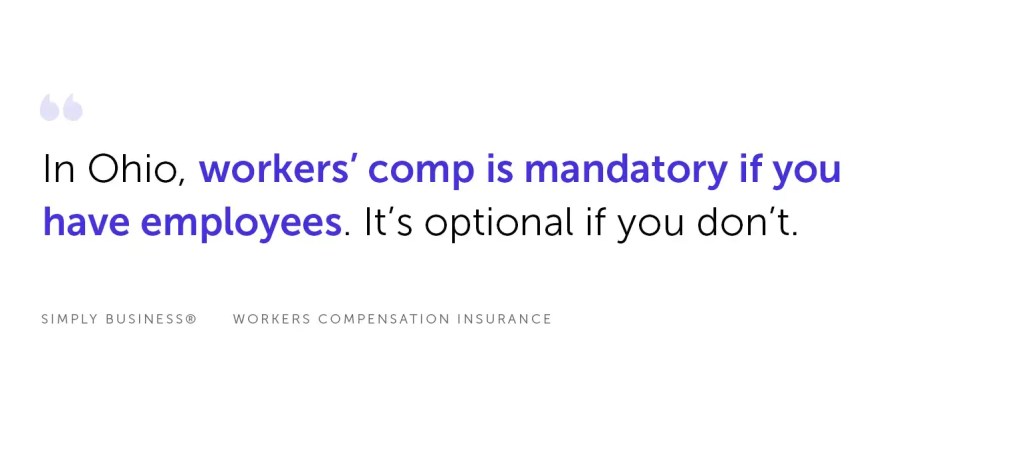Ohio is known as the Buckeye State. But if you know anything about buckeyes, it’s that you don’t eat them. The nut-like seeds might look cool, but they’re toxic. They say it’s better to keep one as a good-luck charm instead.
However, when it comes to business, you can’t always count on luck helping you make correct decisions. Knowledge is better. Especially when it comes to something as important as workers’ compensation insurance.
So if you’re wondering if you need Ohio workers’ compensation insurance, put your buckeye away. You’ve come to the right place.
In this article, I’ll explain if workers’ compensation insurance is required in your state, how much it might cost, and how you can get it. Plus, I’ll provide you with other information you might find useful, including what it means to own a business in a monopolistic state (Spoiler Alert: Ohio is one of four).
Here we go.

Does Ohio Require Workers’ Compensation Insurance?
Yes. Ohio State Law requires that you have an active workers’ compensation policy if you have one or more employees. That coverage needs to be in place from the very first day an employee starts working for you.
This requirement applies to independent contractors or subcontractors with employees as well.
If you hire a live-in nanny in Ohio or a full-time pool cleaner (who doesn’t have one of those?), that would likely make you a “domestic household employer,” and you would be required to carry workers’ comp insurance.
This is true even if the nanny or pool cleaner works only part-time for you. While each is considered a “casual laborer,” in Ohio, you still need to have workers’ comp insurance for them.
Thinking about bringing a temp onboard? If you do that in Ohio, you need workers’ comp insurance.
Something else you should know: Ohio is a monopolistic state. There are rules and requirements you must follow when getting a workers’ compensation policy. More on that coming up.
How to Buy Ohio Workers’ Compensation Insurance
As I just mentioned, Ohio is a monopolistic state. That means it has its own workers’ comp insurance program. And that means you as a business owner can’t shop around for your own policy. You must purchase workers’ compensation insurance through the Ohio Bureau of Workers’ Compensation (BWC) program.
You can self-insure, but very few businesses do for a variety of reasons. I’ll talk about that in a bit. For now, let’s stick to how you go about getting workers’ comp insurance through your state-run agency:
1. How to apply
To obtain coverage, you must submit an application. It’s called an Ohio BWC form U-3. The information you’ll need to complete the application is pretty basic:
- Legal name
- Federal employer ID number (FEIN) or Social Security number if you’re a sole proprietor
- Street address and P.O. box number
- Details describing the type of work you do
2. Ohio U-3 Cost
The range is $120 to $1,000, depending on your payroll. An initial deposit of $120 is due upfront with your application. After the Bureau of Workers’ Compensation reviews your application, they will determine if you owe more money.
3. How to pay
Payment methods and address information can be found here.

Ohio Workers Compensation Self Insurance
I mentioned earlier that there’s a second option for obtaining workers’ comp insurance in Ohio (aside from the state-funded program). And that’s through self-insurance.
Self-insurance means you, as the business owner, put money aside to cover potential workers’ comp claims. Not all states allow it. However, in Ohio, self-insurance is an option.
However, to self-insure in Ohio you are required to put aside a substantial amount of money upfront, and certain requirements may not apply to every business.
Some of the requirements to qualify for self-insurance in Ohio include:
- Permission from the Ohio Secretary of State to do business in Ohio
- Two years’ experience with the state-funded program
- Demonstrated strong financial stability
- Specified bank accounts
- Certified health or medical management plan
All forms and types of supporting documents that you need to submit with your application, along with mailing information, can be found here.
Ohio Workers’ Compensation Certificate of Insurance
Once the Ohio Bureau of Workers’ Compensation processes and approves your application, they’ll issue you a certificate of coverage. It’s valid from the effective date of coverage through the end of the policy year. They’ll also resend one each year with your premium installment schedule.
In case you don’t know, Ohio law requires you to post a copy of this certificate in a highly visible location at your work site or place of business.
Workers’ Compensation Insurance Ohio Rates
The rate you pay in part depends on the type of business you have. If the risk of injury is high as a result of the hazards that accompany the job (e.g., roofing business), then your rate may be on the higher side. If the risk is lower (e.g., catering business), then the rate will likely be lower.
Here’s how it works: When you apply for workers’ comp coverage, the Ohio Bureau of Workers’ Compensation will look to the National Council on Compensation Insurance (NCCI) for a classification — or code that best describes your business. A unique rate is assigned to each classification. That base rate is used to estimate your premium payment.
Cost of Ohio Workers’ Compensation Insurance
If you’re interested in learning about more than just how the rates work, check out this 4-minute video. It’ll take you through the actual breakdown of the equation and show you how costs are calculated.
Are Contractors in Ohio Required to Have Workers’ Compensation Insurance?
In Ohio, workers’ compensation insurance is mandatory if you have employees. It’s optional if you don’t. That’s fairly straightforward.
However, sometimes that line is blurred when it comes to subcontractors and independent contractors because of confusion over who’s considered the employer versus the employee.
The general rule is if you’re an independent contractor or subcontractor who “controls the selection of materials, traveling routes, and quality of performance of another worker,” then you employ that person and are required to provide workers’ compensation coverage for them.
Otherwise, you’re off the hook. Although it can still be a good idea to consider workers’ compensation insurance for yourself. You can learn more about that in this helpful article.
The Buckeye Spirit
Being a Buckeye is often a point of pride for many Ohioans. The same goes for owning a small business and making sure your employees are cared for should they miss work due to a job-related injury or illness.
Your state has you covered on that front, with a program in place that lets you purchase workers’ compensation insurance.
As for the other aspects of protecting your business? That’s where pride comes into play for us on the Simply Business® team. We’ve got your back.
